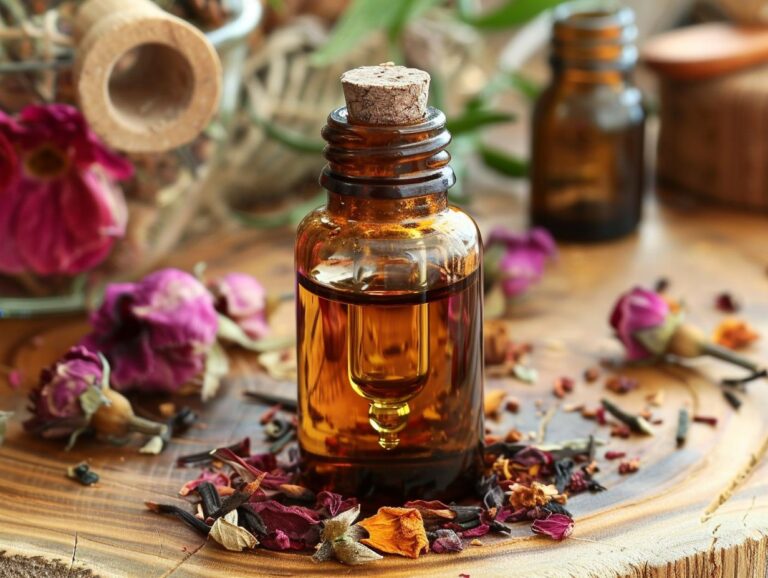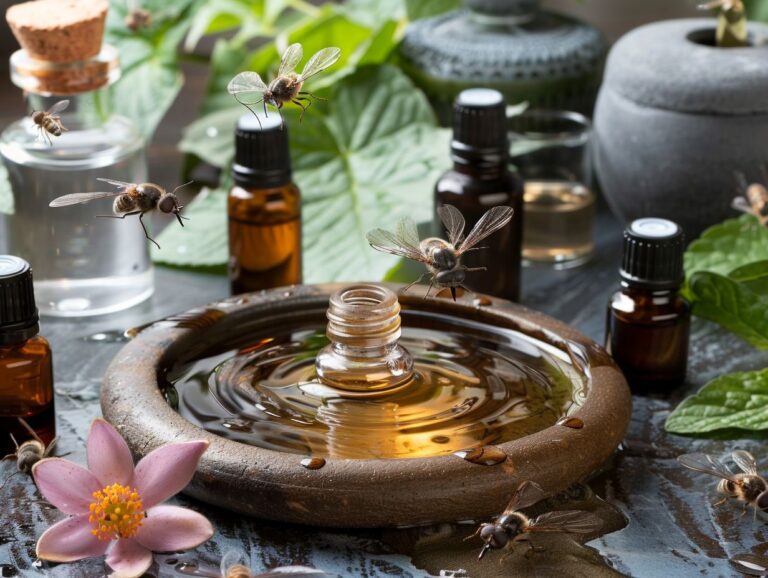Which Essential Oils Have Polyphenols
Curious about the benefits of polyphenols in essential oils? From anti-inflammatory properties to anti-aging benefits, these powerful compounds offer a range of advantages for your health and well-being.
Various essential oils contain polyphenols, including popular options like tea tree, lavender, and peppermint oils. Discover the top essential oils with polyphenols and how they can enhance your daily routine.
Key Takeaways:
What Are Polyphenols?
Polyphenols are a group of natural compounds found in plants that have antioxidant properties due to their ability to scavenge free radicals and inhibit oxidative degradation.
Polyphenols play a crucial role in plant physiology by helping in defense against environmental stresses and pathogens. They are classified into different subclasses such as flavonoids, phenolic acids, and stilbenes.
- The flavonoids, which include flavonols, flavones, flavanones, and anthocyanins, are widely distributed in fruits, vegetables, tea, and wine. Phenolic acids are found in various plant-based foods, while stilbenes are primarily present in grapes and red wine.
These compounds are not only important in protecting plants but also offer numerous health benefits to humans. Polyphenols in the diet have been associated with reduced risk of chronic diseases such as heart disease, cancer, and neurodegenerative disorders.
What Are Essential Oils?
Essential oils are concentrated hydrophobic liquids containing volatile aroma compounds derived from plants through processes like distillation or extraction.
These aromatic oils are extracted from various parts of plants, including flowers, leaves, stems, bark, and roots.
The chemical composition of essential oils can vary widely, with the most common compounds being terpenes, alcohols, esters, and phenols.
Terpenes contribute to the distinct scents and therapeutic properties of many essential oils.
These oils find extensive use in aromatherapy, where their fragrances are believed to have calming, invigorating, or mood-enhancing effects.
In skincare, essential oils are often incorporated into cleansers, moisturizers, and serums for their rejuvenating and balancing properties.
Culinary practices also benefit from the addition of essential oils to flavor dishes, beverages, and desserts, lending a unique taste and aroma.
What Are The Benefits Of Polyphenols In Essential Oils?
The benefits of polyphenols in essential oils include their antioxidant activity, which helps protect cells from oxidative stress and damage caused by free radicals.
Polyphenols are natural compounds found in plants, known for their powerful antioxidant properties. When combined with essential oils, they create a synergistic effect that boosts their health-promoting benefits. Research has shown that this combination not only enhances the antioxidant potential of each component but also exerts anti-inflammatory effects, reducing inflammation in the body.
Polyphenols in essential oils have been found to positively impact various physiological processes, such as cardiovascular health, skin health, and cognitive function. Studies suggest that regular consumption or application of polyphenol-rich essential oils may help in maintaining overall well-being and preventing chronic diseases.
Anti-inflammatory Properties
Polyphenols in essential oils exhibit anti-inflammatory properties attributed to compounds like gallic acid and flavonoids, which help reduce inflammation and promote tissue healing.
Gallic acid, a type of polyphenol found in essential oils, can inhibit pro-inflammatory enzymes like cyclooxygenase and lipoxygenase, thus blocking the production of inflammatory mediators.
Flavonoids present in essential oils possess antioxidant properties that scavenge reactive oxygen species, reducing oxidative stress and inflammation in various body systems.
These actions of polyphenols make essential oils effective in alleviating conditions such as arthritis, skin inflammation, and respiratory issues by modulating key inflammatory pathways.
Antioxidant Effects
Polyphenols in essential oils demonstrate potent antioxidant effects by scavenging free radicals, providing antioxidant protection to cells and tissues against oxidative damage.
These polyphenols play a crucial role in maintaining cellular health by neutralizing reactive oxygen species (ROS) that can cause harm to DNA, proteins, and lipids. By reducing oxidative stress, polyphenols help enhance the body’s natural defense mechanisms, such as activating antioxidant enzymes and regulating gene expression related to antioxidant defenses. This protective action not only supports overall health but also contributes to preventing chronic conditions like cardiovascular diseases, cancer, and neurodegenerative disorders.
Anti-aging Benefits

Quercetin, a potent flavonoid present in certain essential oils, has been found to possess remarkable antioxidant properties that can neutralize free radicals, preventing damage to skin cells and collagen. This protective action not only aids in maintaining youthful, glowing skin but also plays a crucial role in reversing the signs of aging.
Trolox, a powerful water-soluble analog of vitamin E, is another key compound that contributes to the anti-aging effects of polyphenols in essential oils. Its ability to enhance collagen synthesis and boost cellular rejuvenation forms a cornerstone in skincare formulations designed to combat the visible effects of aging.
Which Essential Oils Contain Polyphenols?
Several essential oils contain significant levels of polyphenols, such as thyme, oregano, clove, and cinnamon, known for their antioxidant potential and rich polyphenolic content.
Thyme essential oil is particularly abundant in polyphenols, including thymol and carvacrol, which exhibit strong antioxidant properties. Oregano oil, rich in rosmarinic acid and quercetin, is recognized for its antimicrobial effects in addition to its antioxidant activity. Clove oil stands out for its high levels of eugenol, a potent antioxidant compound with anti-inflammatory properties. Cinnamon essential oil, containing cinnamaldehyde and eugenol, offers both antioxidant and antimicrobial benefits.
These essential oils are often extracted through steam distillation or cold pressing methods to preserve their polyphenolic compounds. They find diverse applications in aromatherapy, skincare, and natural medicine, harnessing the synergistic effects of polyphenols to promote health and well-being.
Tea Tree Oil
Tea Tree Oil exhibits antioxidant properties through its polyphenols, tested using methods such as DPPH assay to evaluate its radical scavenging activity and antioxidant systems.
One of the main polyphenols found in Tea Tree Oil is called catechin, which has been shown to possess strong antioxidant effects by neutralizing harmful free radicals in the body. The antioxidant capacity of Tea Tree Oil can be quantified through Oxygen Radical Absorbance Capacity (ORAC) assays, which measure the ability of antioxidants to protect against oxidative stress.
The DPPH assay, also known as the 2,2-diphenyl-1-picrylhydrazyl test, is a commonly used method to determine the free radical scavenging activity of compounds like Tea Tree Oil. This assay provides valuable insights into the efficiency of the oil in combating oxidative damage and maintaining cellular health.
Lavender Oil
Lavender Oil contains essential oil enrichments with antioxidant properties, making it a subject of antioxidant testing to evaluate its efficacy in protecting against oxidative stress.
The presence of enrichments in Lavender Oil contributes to its potent antioxidant capabilities, which play a crucial role in combating free radicals and oxidative damage. These enrichments, such as phenolic compounds and terpenes, help in neutralizing reactive oxygen species that can harm cells and lead to various health issues.
When subjected to antioxidant testing methods like the DPPH (2,2-diphenyl-1-picrylhydrazyl) assay or ORAC (Oxygen Radical Absorbance Capacity) assay, Lavender Oil showcases its ability to scavenge free radicals effectively. These tests provide quantitative data on its antioxidant capacity, indicating its potential to offer protection against oxidative stress-related conditions.
Peppermint Oil
Peppermint Oil showcases antioxidant properties attributed to its polyphenols, analyzed through techniques like GC-MS analysis to identify the major compounds responsible for its antioxidant behavior.
These polyphenolic compounds play a vital role in the antioxidant activity of Peppermint Oil. Studies have revealed that Peppermint Oil is rich in various polyphenols such as rosmarinic acid, luteolin, and hesperidin. Through GC-MS analysis, researchers have pinpointed these compounds as key contributors to its potent antioxidant behavior. Rosmarinic acid, in particular, has been linked to numerous health benefits, including its antioxidant and anti-inflammatory properties. The precise composition of these polyphenols in Peppermint Oil underscores its therapeutic potential and highlights its significance as a natural remedy for oxidative stress-related conditions.
Eucalyptus Oil
Eucalyptus Oil exhibits properties that inhibit oxidative degradation, making it a potential alternative to synthetic antioxidants due to its natural polyphenolic composition.
Its unique polyphenolic profile, containing compounds like flavonoids and tannins, contributes to its powerful antioxidant capabilities. These antioxidants help neutralize free radicals that can cause oxidative damage to cells, DNA, and proteins. Eucalyptus Oil, with its natural composition, offers a sustainable and eco-friendly option for preserving food products and cosmetics against spoilage and rancidity. The multi-faceted benefits of Eucalyptus Oil extend beyond preserving products, as its antimicrobial properties also aid in enhancing their shelf life naturally.
Rosemary Oil

These polyphenols in Rosemary Oil have been extensively studied for their ability to neutralize free radicals and protect cells from oxidative stress, which can help in maintaining healthy skin and hair.
Many skincare and haircare formulations now incorporate Rosemary Oil due to its antioxidant effects, offering a natural way to combat environmental damage and signs of aging.
The presence of antioxidants in Rosemary Oil can also contribute to extending the shelf life of products by preventing rancidity and oxidation.
Thyme Oil
Thyme Oil demonstrates significant antioxidant capacity attributed to its major polyphenols, contributing to its reputation as a potent antioxidant source with diverse health benefits.
Thyme Oil’s main polyphenolic compounds, such as thymol and carvacrol, play a crucial role in this antioxidant prowess. These compounds act as scavengers, neutralizing harmful free radicals in the body, thereby reducing oxidative stress. The high concentration of flavonoids in Thyme Oil further enhances its antioxidant activity, offering protection against oxidative damage at the cellular level.
The antioxidant properties of Thyme Oil are believed to promote various health benefits, including supporting a healthy immune system, reducing inflammation, and potentially lowering the risk of chronic diseases. By combating oxidative stress, Thyme Oil may contribute to overall well-being and longevity, making it a valuable addition to a health-conscious lifestyle.
Oregano Oil
Oregano Oil exhibits antioxidant behavior by scavenging peroxyl radicals, indicative of its ability to provide antioxidant protection and maintain cellular integrity.
Antioxidants are crucial for combating oxidative stress within the body, which can lead to cellular damage and contribute to various health issues.
Oregano Oil, with its potent antioxidant properties, works by neutralizing harmful peroxyl radicals. These radicals are highly reactive and can cause damage to lipids, proteins, and DNA within cells. By scavenging peroxyl radicals effectively, Oregano Oil aids in protecting cells from oxidative damage, thereby supporting the body’s natural defense mechanisms.
Its role in antioxidant protection extends to helping maintain healthy immune function and overall well-being.
Clove Oil
Clove Oil demonstrates the ability to inhibit autoxidations, a key feature evaluated through antioxidant testing methods to assess its effectiveness in combating oxidative stress.
The capacity of Clove Oil to act as an antioxidant and counteract the process of autoxidation is crucial for its potential therapeutic applications. By being able to inhibit the oxidative degradation of lipids, proteins, and other biomolecules, Clove Oil effectively prevents the formation of harmful reactive oxygen species (ROS) and subsequent oxidative damage to cells and tissues.
Antioxidant testing, such as the Oxygen Radical Absorbance Capacity (ORAC) assay, has been utilized to quantify the antioxidant capacity of Clove Oil by measuring its ability to neutralize free radicals and prevent lipid peroxidation. The results of these tests provide valuable insights into the mechanisms through which Clove Oil exerts its antioxidant effects, offering a promising avenue for further research on natural antioxidant compounds.
Cinnamon Oil
Cinnamon Oil shows antioxidant properties by scavenging peroxyl radicals, indicating its potential to neutralize oxidative damage and enhance antioxidant defense mechanisms.
This natural substance’s ability to effectively scavenge peroxyl radicals plays a crucial role in combating oxidative stress within cells. By targeting and neutralizing these harmful radicals, Cinnamon Oil aids in preventing cellular damage and maintaining overall cellular health. The antioxidant defense mechanisms are bolstered through the interaction of Cinnamon Oil with other antioxidants, creating a synergistic effect that enhances the body’s ability to combat free radicals effectively.
Lemongrass Oil
Lemongrass Oil exhibits significant antioxidant activity, measured through methods like absolute antioxidant activity to quantify its efficacy in neutralizing free radicals and oxidative stress.
Studies have revealed that Lemongrass Oil’s antioxidant properties can be attributed to its high content of polyphenols and flavonoids, which are known for their ability to scavenge and eliminate harmful free radicals. These bioactive compounds help protect cells from damage caused by oxidative stress, thereby promoting overall health and well-being. Lemongrass Oil has been shown to have a synergistic effect when combined with other antioxidants, further enhancing its effectiveness in combating oxidative damage.
Ginger Oil

Ginger Oil composition includes Alkanes and oxygen-containing compounds, known for their potential antioxidant properties and contributions to overall health benefits.
Alkanes are a type of hydrocarbon present in Ginger Oil, such as dodecane, tetradecane, and tridecane, while the oxygen-containing compounds include gingerol, which is a prominent component responsible for its antioxidant effects.
The antioxidant properties of Ginger Oil have been linked to various health benefits, such as reducing inflammation, improving digestive issues, and boosting immunity.
Studies suggest that the combination of Alkanes and oxygenated compounds in Ginger Oil work synergistically to combat oxidative stress and protect cells from damage caused by free radicals.
Frankincense Oil
Frankincense Oil demonstrates antioxidant potential against oxidative stress, tested using methods like AAPH assay to assess its efficacy in protecting cells from damage caused by free radicals.
Antioxidants play a crucial role in maintaining cellular health by neutralizing the harmful effects of oxidative stress. Research has shown that Frankincense Oil contains compounds like boswellic acids that possess strong antioxidant properties. When subjected to AAPH assay, Frankincense Oil exhibited significant scavenging activity against free radicals, thereby reducing the risk of oxidative damage. This natural oil has been found to enhance the body’s own defense mechanisms against oxidative stress, making it a promising candidate for combating various diseases related to oxidative imbalance.
Myrrh Oil
Myrrh Oil exhibits antioxidant properties characterized by its ability to protect against oxidative damage, validated through assays like fluorescein to measure its antioxidant efficacy.
The antioxidant properties of Myrrh Oil play a vital role in neutralizing free radicals, which are unstable molecules that can cause cell damage and contribute to aging and various diseases. By scavenging these free radicals, Myrrh Oil helps in maintaining cellular integrity and reducing the risk of oxidative stress-induced damage. The efficacy of Myrrh Oil’s antioxidant activity can be further evaluated through assays that analyze its ability to inhibit lipid peroxidation and enhance the cellular antioxidant defense mechanisms.
Turmeric Oil
Turmeric Oil shows antioxidant properties validated through antioxidant testing methods, such as assays using Tussilago farfara as a model system to assess its free radical scavenging abilities.
Antioxidants play a crucial role in protecting cells from damage caused by free radicals, unstable molecules that can lead to oxidative stress and various health issues.
By utilizing Tussilago farfara as a test model, researchers can gauge the effectiveness of Turmeric Oil in neutralizing these harmful compounds and preventing oxidative damage.
Studies have demonstrated that Turmeric Oil’s antioxidant effects are attributed to its active component, curcumin, which is known for its potent antioxidant and anti-inflammatory properties.
Black Pepper Oil
Black Pepper Oil exhibits antioxidant potential attributed to compounds like Rutin, known for their ability to scavenge free radicals and enhance cellular antioxidant defenses.
Rutin, a flavonoid found in Black Pepper Oil, acts as a potent antioxidant by neutralizing harmful free radicals that contribute to oxidative stress in the body. This powerful antioxidant property not only helps protect cells from damage but also plays a crucial role in supporting overall health. By boosting cellular antioxidant defenses, Black Pepper Oil can aid in reducing oxidative damage and inflammation, thereby promoting healthy aging and minimizing the risk of chronic diseases. Incorporating Black Pepper Oil into your routine can be a convenient way to harness the benefits of its antioxidant-rich composition.
Frequently Asked Questions
Which Essential Oils Have Polyphenols?
FAQs are currently unavailable for this topic.








2 Comments